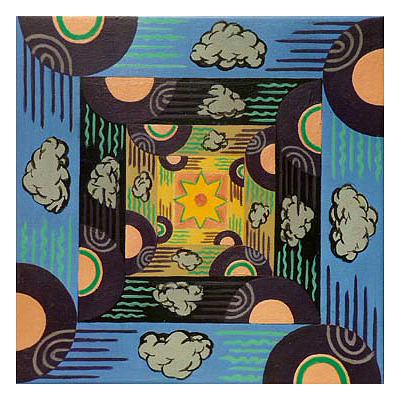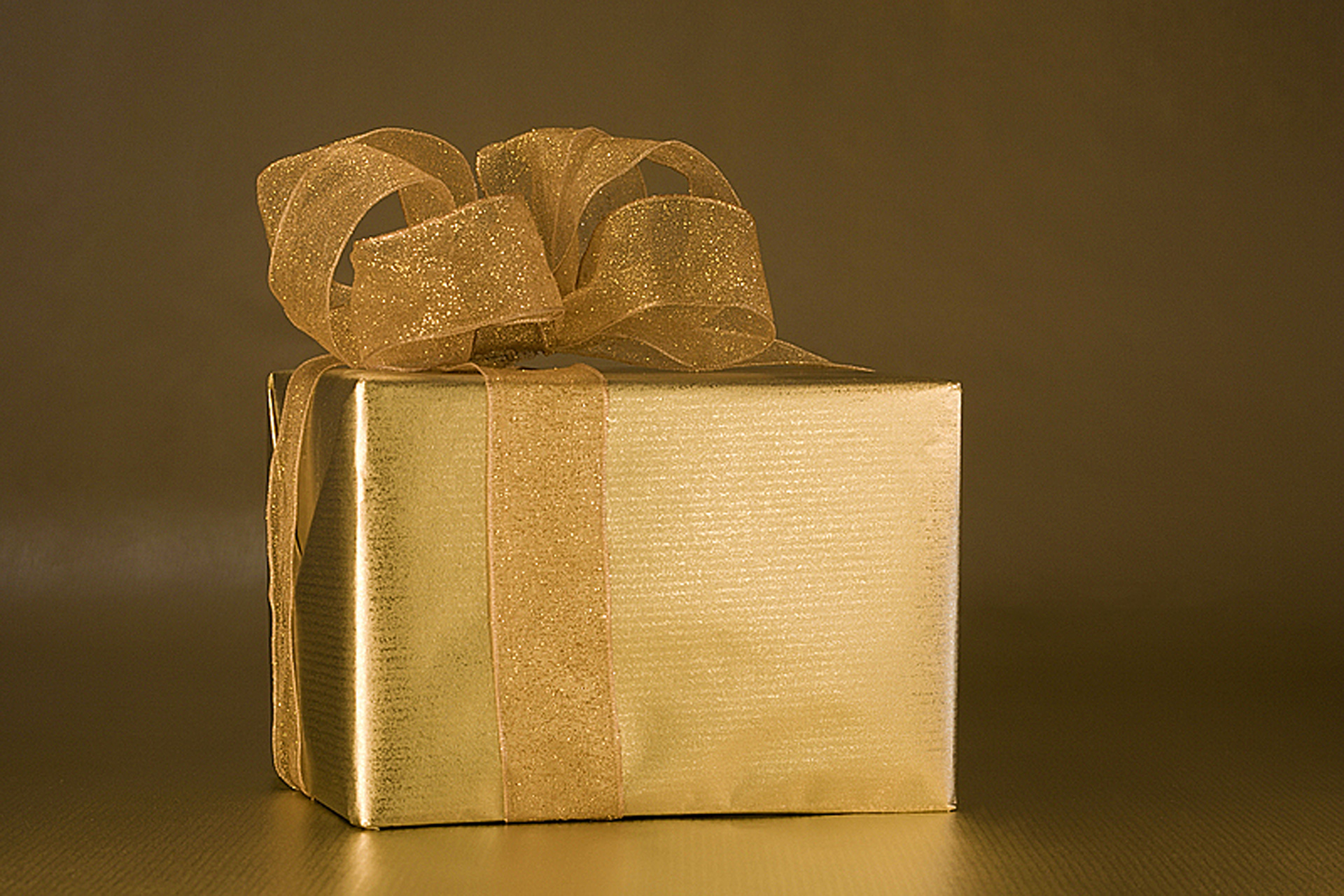We’re running a workshop, Adrian is in full flow delivering our “Practical Thinking” programme. I set up my laptop on a side table and to make the most use of down time as it occurs, I decide to write a piece for Fellowship of Mind…
At this point I hear a light knock on the door and go out to answer it. A construction worker in a high-viz jacket tells me he was just passing and points to a bag that has been left in the corridor and could I take care of it? I carry it quietly, intrigued and a little anxious about finding its owner, back into the room, as the delegates grapple with critical thinking exercises. Prompted by the mystery parcel, my storytelling imagination weaves a metaphorical tale…
The Mystery Gift
It is noon, a few days before Christmas. You hear the doorbell chime, and open your door to the postman who hands you a large square box, securely wrapped in gold foil, which he asks you to sign for.
Now inside, you study the shiny, inviting parcel. It has your name clearly handwritten in bold, calligraphic text, in a style that looks vaguely familiar, and a rather unique looking stamp from a country you’ve never heard of. You’re excited, because the parcel is unexpected, and you don’t recognise the postmark either. “Santa Claus must be getting lazy – or very busy – and now has access to online shopping” you muse wryly. Its doesn’t weigh much, (“he’s a bit stingy on the postal costs”) and no amount of shaking gives you any clues to what is inside.
You turn the box over and see written on the back, in capital letters:
ONLY TO BE OPENED POSTHUMOUSLY
“Well that’s rather scary and weird! Who on earth has sent me a parcel that I won’t be here to open? What do they know about me and what’s all this about? And I wonder what will happen if I do open it…?” you ask yourself. You sit with your dilemma, feeling unsettled, and staring at the box , as if doing so will reveal its contents….
Getting Comfortable with Ambiguity
It is puzzling, frustrating – and yet exciting – to have something wrapped up and to not know what’s inside, isn’t it? And being explicitly denied from finding out, as in our story, exaggerates those feelings. Our minds are curious and impatient to know what is hidden and want to have the puzzle solved. We can find ambiguity quite stressful – prone to think in black and white, we’re not fond of shades of grey. Sometimes we want to make any decision or take any action, regardless of whether that is wise, just to relieve the passivity and internal pressure we feel of not being able to get to a solution or know how things will turn out.
Its break time – I ask the delegates in the room if the mystery bag belongs to one of them. Yes! Great. I hand it over and feel I can relax again. That’s one less parcel to worry about.
The story continues…
…Your desire to find out what’s inside the box and who sent it to you escalates so much you decide you are going to open it anyway, whatever the consequences. Holding your breath in anticipation, you tear off the gold foil paper, preserving the written parts carefully in case you need them. You find more layers of paper, another smaller box, polystyrene “snow” which drifts onto the floor around your feet, and sheets of bubble wrap that crinkle satisfyingly like a cat’s toy. Removing them all, you unveil a beautiful clear glass sphere about 60cm in diameter. Inside, suspended by clear threads in the centre, is an envelope, again with your name on…
The Creative Tension of Uncertainty
Becoming comfortable with ambiguity and lack of knowing, is, I would suggest, critical for our thinking. We can only come up with new ideas, or see things afresh, if we embrace the creative tension that comes with opening up a gap to the unknown, and if we don’t let go of our usual fixations, we can’t see the bigger picture either. For our lives, dealing with situations that provide us with that experience have great value in expanding our capacity to do so. Fictional stories too, allow us to practise not knowing, and we see those forces at play as we follow plots, unravel clues, and anticipate outcomes, enjoying the journey as we do so.
With reference to our parcel’s “posthumous” instruction, we do, of course, all “know” that we will, one day, die, but it does not stop us trying to avoid realising it. The fact brings our relationship to unpredictability into sharp focus. We have to live with the uncertainty of not knowing how or when that will be, both for ourselves and others. And when our mortality is brought to our attention, as it is in our story, we want to push the idea firmly to the back of our minds, ignore it, and cast it into the shadows – an approach that is sanctioned and encouraged in our culture.
The workshop delegates are busy with post-its coming up with ideas for the “Creative Thinking” component of the day, and I’m also dying to know what’s in the parcel…
The story concludes…
…This mystery is really stretching your patience. You decide to press on, as you now want to know what message this crystal ball contains. You find a hammer, (which almost seems to appear in your hand) and bring it down expertly on the sphere to break the glass. It cracks enough for you to carefully dismantle it, and you reach in for the envelope. What a relief to have it in your hand! Finally you will have the answer.
You see there’s a note inside, which, with a racing pulse, you read:
“CONGRATULATIONS ON OPENING THE BOX
YOU CAN’T LIVE YOUR LIFE FOLLOWING OTHER PEOPLE’S INSTRUCTIONS.
YOU ARE UNIQUE AND SO YOU ARE YOUR OWN BEST GUIDE.
THERE IS NO TEMPLATE, LIFE IS NOT A REHEARSAL, YOU CAN’T KNOW THE FUTURE, IT IS UNCERTAIN, BUT YOU CAN CO – CREATE IT.
BE BOLD, DO WHAT YOU ENJOY, TREAT OTHERS KINDLY.”
– YOUR FUTURE SELF
You take a deep breath, as the light increases in your mind. In fact, as you feel your muscles move, and the heat of a nearby radiator, you see that you’ve been asleep. You wake up, brightly, realising you’ve had a very potent and helpful dream. Feeling energised, you resolve to take more risks, reorganise your priorities, and look for ways to be more creatively engaged in the unfolding of your life…
Reflection on Endings can Reinvigorate Us
We might not all be offered insights such as this, from our dreaming minds, but in our waking lives, we can use active reflection to gain the kind of realisation the character in our story did.  For any situation, we could imagine the “death” of ourselves, another person, or any enterprise, and use an imagined retrospective view to gain new insight and perspective, in order to reinvigorate us. We need not go as far as meditating in cremation grounds (as they do in some Buddhist traditions after much training), and it is important to do this while in a positive mental state, but every now and then by reflecting in this way we can raise our view higher and further, come more fully back to life and see things clearly, in a grounded way.
For any situation, we could imagine the “death” of ourselves, another person, or any enterprise, and use an imagined retrospective view to gain new insight and perspective, in order to reinvigorate us. We need not go as far as meditating in cremation grounds (as they do in some Buddhist traditions after much training), and it is important to do this while in a positive mental state, but every now and then by reflecting in this way we can raise our view higher and further, come more fully back to life and see things clearly, in a grounded way.
If we do try and face the fact that our current life will end, we can start to gradually accept that with more ease, knowing that we don’t, or can’t know when or how it will happen. And as time goes by, and friends, family members and ventures pass away, we have opportunities to get a little more familiar, and our perception is reorganised in fresh ways to take it into account. From here, if we try to, I think we can shift our focus and begin to treat each day as a gift. In time, we can start to value life more and more fully in the present, and experience it as a creative process to be fully engaged with, rather than wanting it to have conceptual fixed points and predictable happenings where we recreate the past, or push unconsciously towards an idealistic future in headstrong ways that don’t take account of what’s really happening – all tendencies that are familiar to us.
The Gift of Presence
I’m writing this on the second anniversary of my father’s death. It has been a journey of letting go – one I thought I would never be able to make. I’m learning again that life isn’t all wrapped up – the future is an unfolding of the present; what we do in each moment does inform and create causes which lead to our future moments, but if we can create and actively hold open those mental gaps to keep things in perspective, we can make choices in the light of the bigger picture of our lives and what is really important to us as one-off individuals alive (at least in the way we currently understand it), for a limited amount of time.
So I would encourage you to sincerely give the gift of your own unique presence as you share your time and energy with those around you, and with yourself and leave you with the question:
What message do you think your future self would write for you,
in your “dream present”?
…I switch out the light as we depart from the workshop, trolleys in tow.
Sophie Brown
References
Acrylic painting on ceramic tile by my father Graham Kingsley Brown 3 May 1932 – 16 Dec 2011, Artist & Poet
